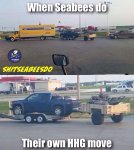- 410
- 35
- 28
- Location
- Atlanta, Ga
This is in the state of Georgia
A few questions regarding towing my military vehicle. I have a 05 Dodge 2500 with a 5.9l cumming turbo with a banks exhaust brake and a 10 ton duel axle 25 ft goose neck trailer. The vehicle I will towing is about 13500 lbs and the trailer is about 5600 lbs with electric brakes on both axles. The two questions I have are:
1: what size grade 70 chains would be appropriate for bringing the vehicle to the trailer.
2, base on the weight raipting of the trailer and the vehicle towing it, what type license would I need, I'm assuming a class A non-CDL Since I'm not for hire and moving my own toys.
thanks for the help.
jason
A few questions regarding towing my military vehicle. I have a 05 Dodge 2500 with a 5.9l cumming turbo with a banks exhaust brake and a 10 ton duel axle 25 ft goose neck trailer. The vehicle I will towing is about 13500 lbs and the trailer is about 5600 lbs with electric brakes on both axles. The two questions I have are:
1: what size grade 70 chains would be appropriate for bringing the vehicle to the trailer.
2, base on the weight raipting of the trailer and the vehicle towing it, what type license would I need, I'm assuming a class A non-CDL Since I'm not for hire and moving my own toys.
thanks for the help.
jason



